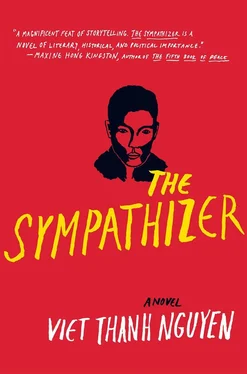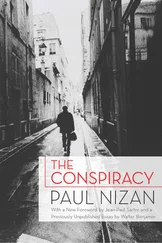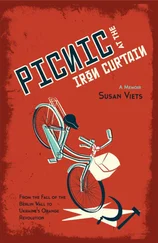General—
Shut up! The only person he was looking at was himself in the mirror. We will never speak of this again.
And we never did.
The next day we buried Linh and Duc. Their cold bodies had lain in a naval morgue overnight, cause of death now official: a single slug, type unknown. The bullet would forever spin in Bon’s mind on a perpetual axis, taunting and haunting him with the even chance of coming from friend or foe. He wore a white scarf of mourning around his head, ripped from his bedsheet. After we had lowered Duc’s small coffin on top of his mother’s, both to share the one home for eternity, Bon threw himself into their open grave. Why? he howled, cheek against the wooden crate. Why them? Why not me? Why, God? Weeping myself, I climbed in the grave to calm him down. After I helped him out, we heaped the earth onto the coffins while the General, the Madame, and the exhausted priest watched silently. They were innocents, these two, especially my godson, who was probably the closest I would get to having a real son. With every strike of the iron shovel against the small mound of loamy earth, waiting to be poured back into the cavity from which it had been extracted, I tried believing that those two bodies were not truly dead but simply rags, shed by emigrants journeying to a land beyond human cartography where angels dwelled. Thus my sacerdotal father believed; but thus I could not.
Over the next few days, we wept and we waited. Sometimes, for variety, we waited and we wept. Just when the self-flagellation was beginning to wear me down, we were picked up and shuttled on to Camp Pendleton in San Diego, California, this time via an airliner where I sat in a real seat with a real window. Awaiting us was another refugee camp, its higher grade of amenities evidence that we were already profiting from the upward mobility of the American Dream. Whereas on Guam most of the refugees had lived under tents hastily erected by the marines, in Camp Pendleton we all had barracks, a boot camp to gird us for the rigors of learning Americana. It was here, during the summer of ’75, that I wrote the first of my letters to Man’s aunt in Paris. Of course, as I composed my letters, I was writing to Man. If I started a letter with a few tropes we had agreed on — the weather, my health, the aunt’s health, French politics — then he would know that written in between the lines was another message in invisible ink. If such a trope was absent, then what he saw was all there was to see. But that first year in America, there was not much need for steganography, the exiled soldiers hardly in any condition to foment a counterstrike. This was useful intelligence, but not one needing secrecy.
Dear Aunt, I wrote, pretending she was mine, I regret having to tell you something horrible as my first words to you in so long. Bon was not in a good state. At night, as I lay sleepless in my bunk, he tossed and turned in the rack above, his memories grilling him alive. I could see what flickered on the interior of his skull, the face of Man, our blood brother whom he was convinced we had abandoned, and the faces of Linh and Duc, their blood on his hands and mine, literally. Bon would have starved to death if I had not dragged him from his bunk to the mess hall, where we ate tasteless chow at communal tables. Along with thousands of others that summer, we also bathed in showers that lacked stalls and lived with strangers in barracks. The General was not exempted from these experiences, and I passed a great deal of time with him in the quarters he shared with Madame and their four children, along with three other families. Junior officers and brats, he muttered to me on one visit. This is what I’ve been reduced to! Sheets strung up on clotheslines divided the barracks into family quarters, but they did little to shield the delicate ears of Madame and the children. These animals are having sex day and night, he growled as he sat with me on the cement stoop. Each of us was smoking a cigarette and sipping from a mug of tea, which was what we had instead of even the cheapest liquor. They have no shame! In front of their own children and mine. You know what my eldest asked me the other day? Daddy, what’s a prostitute? She saw some woman selling herself down by the latrines!
Across the lane from us, in another barracks, a spat between a husband and wife that had started with the usual name-calling suddenly erupted into a full-blown fight. We saw none of it but heard the unmistakable sound of flesh being slapped, followed by the woman screaming. A small crowd of people soon gathered outside the doorway of the barracks. The General sighed. Animals! But among all this, some good news. He extracted a newspaper clipping from his pocket and handed it to me. Remember him? Shot himself. That’s good news? I asked, fingering the article. He was a hero, the General said, or so I wrote my aunt. It was an old article, published a few days after the fall of Saigon and mailed to the General by a friend in another refugee holding pen in Arkansas. The centerpiece was a photograph of the dead man, flat on his back at the base of the memorial the General had saluted. He could have been resting on a hot day, looking up at a sky as blue as a jazz singer, except the caption said he had committed suicide. While we were flying to Guam, with tanks entering the city, the lieutenant colonel had come to the memorial, drawn his service pistol, and drilled a hole in his balding head.
A real hero, I said. He had a wife and a number of children, how many I could not recall. I had neither liked him nor disliked him, and while I had considered his name for evacuation, I had passed him over. A feather of guilt tickled the back of my neck. I didn’t know he was capable of doing that, I said. If I had known. .
If any one of us could have known. But who could have? Don’t blame yourself. I’ve had many men die under my watch. I’ve felt bad for each one, but death is a part of our business. It may very well be our turn one day. Let’s just remember him as the martyr he is.
We toasted with tea to the lieutenant colonel’s memory. Except for this one act, he was not a hero, so far as I knew. Perhaps the General also sensed this, for the next thing he said was, We could certainly have used him alive.
For what?
Keeping an eye on what the communists are doing. Just as they’re probably keeping an eye on what we’re doing. Have you done any thinking about that?
About how they’re keeping an eye on us?
Exactly. Sympathizers. Spies in our ranks. Sleeper agents.
It’s possible, I said, palms damp. They’re devious and smart enough to do it.
So who’s a likely candidate? The General looked at me intently, or perhaps he was staring at me in suspicion. He had his mug in hand and I kept it in my peripheral vision as I met his gaze. If he tried to crack me over the head with it, I’d have half a second to react. The Viet Cong had agents everywhere, he continued. It just makes sense there would be one of them with us.
You really think one of our own men could be a spy? By now the only part of me not sweating were my eyeballs. What about military intelligence? Or the general staff?
You can’t think of anybody? His eyes never left my own cool ones, while his hand still gripped the mug. I had a sip of cold tea left in mine and I took it now. An X-ray of my skull would have shown a hamster running furiously in an exercise wheel, trying to generate ideas. If I said I did not suspect anyone, when he clearly did, it would look bad for me. In a paranoid imagination, only spies denied the existence of spies. So I had to name a suspect, someone who would sidetrack him but who would not be an actual spy. The first person who came to mind was the crapulent major, whose name had the desired effect.
Him? The General frowned and at last stopped looking at me. He studied his knuckles instead, distracted by my unlikely suggestion. He’s so fat he needs a mirror to see his own belly button. I think your instincts are off for once, Captain.
Читать дальше












